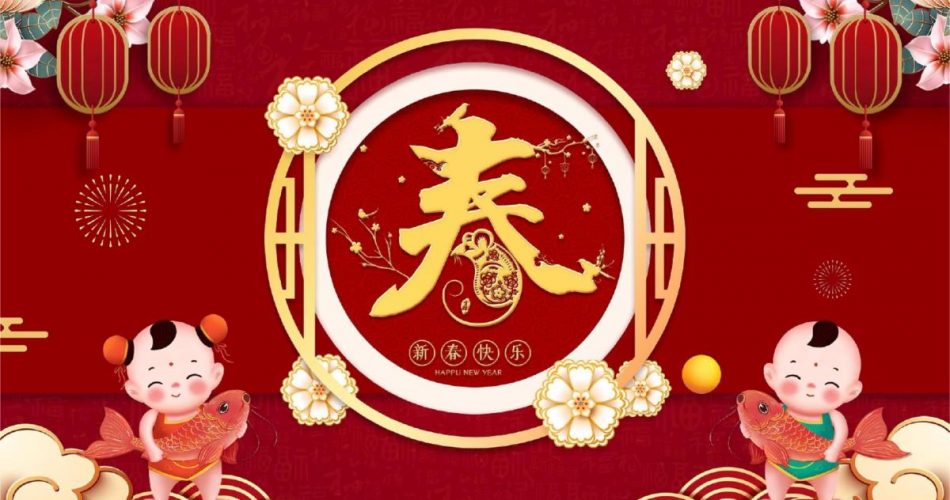| Chinese New Year | Time | The Zodiac Year |
| Chinese New Year 2023 | Sunday, January 22 | Year of the Rabbit |
| Chinese New Year 2024 | Saturday, February 10 | Year of Dragon |
| Chinese New Year 2025 | Wednesday, January 29 | Year of Snake |
| Chinese New Year 2026 | Tuesday, February 17 | Year of Horse |
As a traditional Chinese festival, the Spring Festival is also the traditional Chinese “New Year”. This festival has always been highly valued by the Chinese people and is one of the grandest and most lively traditional festivals in China.
Nowadays, Chinese New Year is spread to numerous foreign countries such as the USA, the UK, India, Thailand, and Brazil. The rapid economic growth and the improving political status of China in the international community facilitate the circulation of the Chinese culture and customs.
Table of Contents
- What Is the Origin of the Chinese New Year?
- Why the Chinese New Year Important?
- What are the Customs of the Chinese New Year?
- What is the Unique Food during the Chinese Spring Festival?
- Chinese New Year in Foreign Countries
- What are the Common Blessings/Greetings for the Chinese New Year/Spring Festival?
- FAQ About Chinese New Year
Considering the requests of many users to get the hang of China’s New Year or the Spring Festival, this article tries to elaborate on this grandest traditional festival in China. If you want to know when the New Year’s Day is and how you can celebrate it as Chinese people, you can just refer to this tutorial.
What Is the Origin of the Chinese New Year?
The Chinese New Year is the first day of the year, traditionally known as the Lunar New Year Festival. The Chinese New Year is commonly known as New Year, New Year’s Day, New Year’s Jubilee, New Year’s Jubilee, New Year’s Day, Big Year, etc.
Orally, the lunar new year is also known as Duyuan, Celebration of the Year, New Year and Big Year. It is one of the grandest, liveliest and most important ancient traditional festivals in China and unique to the Chinese people.
Legend 1: originating from the story of “Nian” (New Year) beast
The most common story about the origin of the Chinese New Year is related to a beast called “Nian” (New Year), with a fierce, tentacled head.
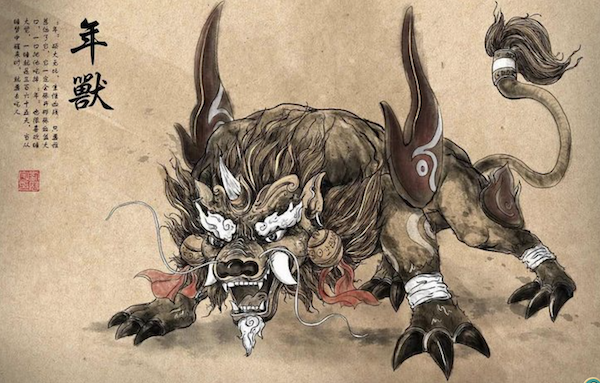
The “Nian” lives deep under the sea for many years and only comes ashore on New Year’s Eve to devour livestock and harm human lives.
On New Year’s Eve, people in villages flee to the mountains with their families to escape the “New Year” beast. One a New Year’s Eve, an old man came from outside the village begging for money.
The townspeople were in a hurry and panic, except for an old woman at the east end of the village who gave the old man some food and advised him to go up to the mountain to avoid the “Nian” beast.
The old man laughed as he stroked his beard, “If you had let me stay at home for one night, I would drive the “Nian” beast away.” The old woman kept persuading him to go up to the mountain, but the old man just laughed without saying a word.
In the midnight, “Nian” beast broken into the village, but it sensed different atmosphere in this village this time. The old woman at the east of the village put up large red light to lighten the whole house.
The “Nian” beast shuddered, crying out with a strange sound. When it approached the door, there was a sudden sound of “bang, bang, bang” in the courtyard, and “Nian” shuddered, not daring to come forward again.
As it turns out, the “Nian” beast is most afraid of red, fire and explosions. At that moment, the door of the old woman’s house opened wide, only to see an old man in a red robe laughing in the courtyard. The “Nian” beast was so frightened that he fled in disarray.
The next day was the first day of the New Year and the people who had returned were surprised to see the village unharmed. It was then that the old woman came to her senses and rushed to tell the villagers about the begging old man’s promise.
The story soon spread around the village and people learned of the way to drive away the “Nian” beast.
From then on, on every New Year’s Eve, every family puts up red couplets and firecrackers, and every household is lit up by candlelight, waiting for the new year.
Early in the morning on the first day of the Lunar New Year, the Chinese people tend to visit their friends and relatives to say hello. This custom has spread and become the grandest traditional festival among Chinese folk. This is the origin of the Chinese New Year.
Legend 2: from the emperor Shun
The Chinese New Year originated from the era of the emperor Shun. One day, more than 2000 years ago, Shun assumed the throne of the Son of Heaven and led his men in worshipping heaven and earth.
Since then, people have taken this day as the first day of the year. This is said to be the origin of the Lunar New Year, later called Spring Festival.
Why the Chinese New Year Important?
The Chinese New Year is the first of all festivals and is the most solemn traditional festival of the Chinese people. Influenced by Chinese culture, currently, some countries and regions around the world also celebrate Chinese New Year. Nearly 20 countries and regions have made Chinese New Year as an official holiday either as a whole or in some of the cities.
In China, Spring Festival, Qingming Festival, Dragon Boat Festival, and Mid-Autumn Festival are four traditional Chinese holidays. The Chinese New Year is the most important traditional festival in China and has been celebrated for thousands of years. This day is not only the end of the year, but also involves a rich cultural connotation and holds an immense importance in the hearts of the Chinese people.
In short, the Chinese New Year is the most crucial traditional festival for Chinese to get reunited from different cities and even countries.
What are the Customs of the Chinese New Year?
There are different traditions in China during the lunar New Year. These traditions mark the uniqueness of the New Year’s Day.
Normally, these customs gather families to finish specific activities, thus enhancing family relationship. Although customs to celebrate the Chinese New Year differ from a province to another, there are some common ones.
1. Do Spring Festival Shopping
There is a long history of the Chinese New Year, so there is also a wide variety of customs throughout the country, each with its own characteristics from north to south.
Although customs vary from place to place, preparing and giving New Year’s gifts is a “must” for almost all Chinese people. Spring Festival shopping is mainly to buy food, clothing, gifts and so on, is called “New Year’s Eve”. Shopping for New Year’s is an important activity for the Chinese people.
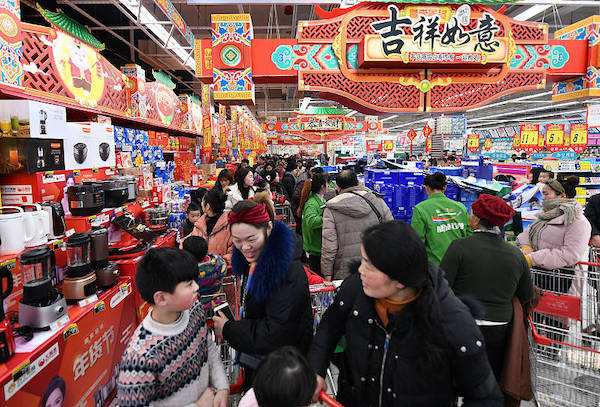
2. Do Dust Sweeping
On New Year’s Eve, Chinese people tend to sweep the dust. Dust sweeping is the end-of-year cleaning, where every room is cleaned, appliances are washed, and bedding and curtains are removed and washed. There was a joyful atmosphere everywhere as people work on hygiene and cleanliness to welcome the New Year.
To some extent, sweeping dust is to sweep away all bad luck and misfortune in order to pray for good fortune in the coming year.
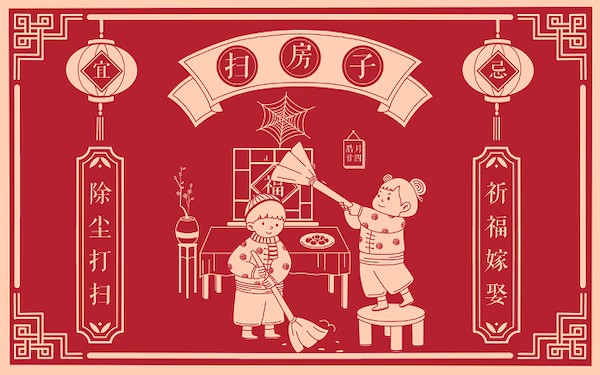
3. Put up couplets
It is a traditional Chinese custom for the New Year to put up couplets, adding to the festive atmosphere and conveying good expectations for the New Year and new life.
Apart from couplets, Chinese families also put up door gods, banners, Chinese New Year paintings and the word “fortune” to celebrate the Chinese New Year.
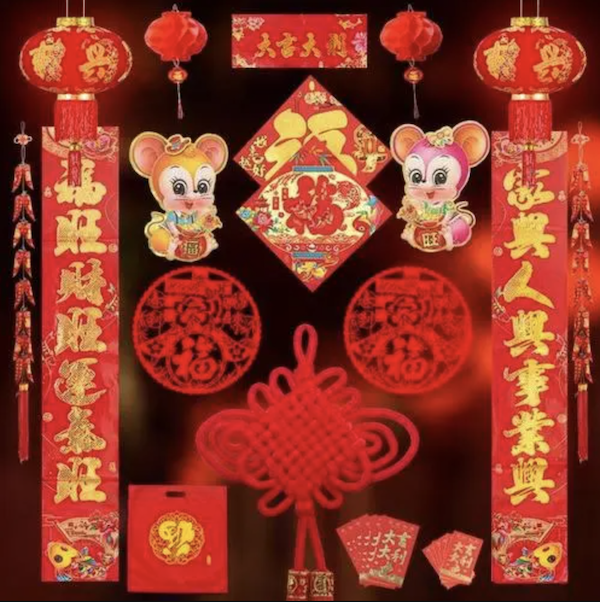
4. Lunar New Year’s Eve Dinner
New Year’s Eve dinner, also known as New Year’s dinner and reunion dinner, refers to the family dinner at the end of the New Year’s Eve. The New Year’s Eve dinner originates from ancient rituals of the end of the year, when the gods and ancestors were worshipped and then reunited for a meal.
The New Year’s Eve dinner is the highlight of the Chinese New Year and is not only very meaningful. Before eating the Lunar New Year meal, the gods are worshipped and the meal is served only after the worship ceremony is completed.
Chinese households tend to prepare different dishes with rich connotations to symbolize a good new year, such as fish (symbolizing the yearning for success/best).
The Chinese New Year’s Eve dinner is a family reunion dinner, and this is the most sumptuous and important meal at the end of the year.
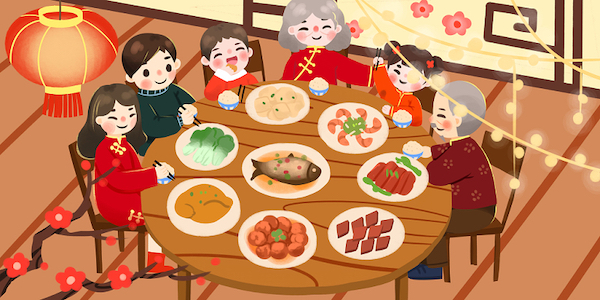
5. Stay up Late or all Night on New Year’s Eve
Staying up late for the new year coming in is one of the New Year’s Eve events with a long history.
The custom of the Lunar New Year is that all the houses are lit and the family gathers together to keep the fires from going out, waiting for the time when the old year is welcomed into the new year.
On New Year’s Eve, the lanterns are kept burning all night long, which is called “lighting the lanterns to illuminate the year” or “lighting the fire of the year”, and all the houses are lit with lanterns and candles, but also specifically under the beds, and the lanterns and candles are lit all over, which is called “illuminating the false consumption”. If this is done, the family will be rich for the coming year.
On New Year’s Eve, the whole family gathers together, eats New Year’s Eve dinner, lights candles or oil lamps, sits around the fire and chats, and keeps vigil all night long, symbolizing that all evil and disease will be driven away and that the new year will be auspicious and prosperous.
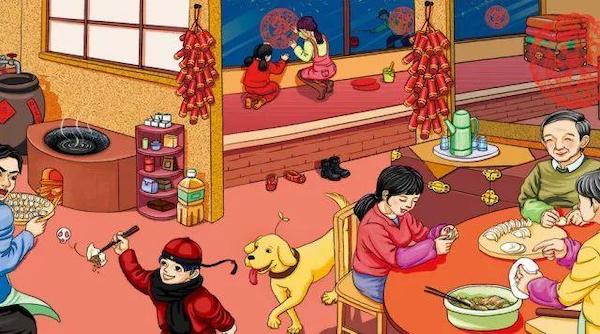
6. Give Money to Children as a Gift during Lunar New Year
The money given during the lunar new year will keep evil spirits at bay and the younger generation will have a peaceful year if they receive it.
Historically, the “New Year” money was usually handed out by elders to their juniors in the countdown to the New Year, to express their concern and sincere blessings; when it comes to the money given by the younger generation to the elderly, the word “year” in the Chinese New Year money refers to years of age, in the hope that the elderly would live a long life.
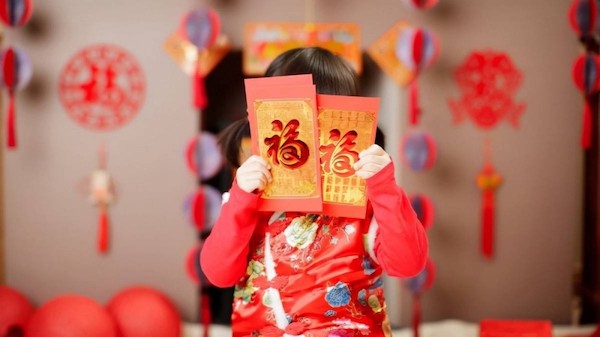
7. Attend Temple Fairs
Temple fairs are one of the folklore activities during the Chinese New Year. The Guangfu Temple Fair is one of the two major temple fairs in China, along with the Temple Fair of the Temple of Earth in Beijing, in which there are themed-events such as the Puppet Gathering, Chinese Masterpieces, the Martial Arts Conference and the Lantern Festival with a rich mix of blessing culture, folklore culture, food culture, trade and leisure culture.
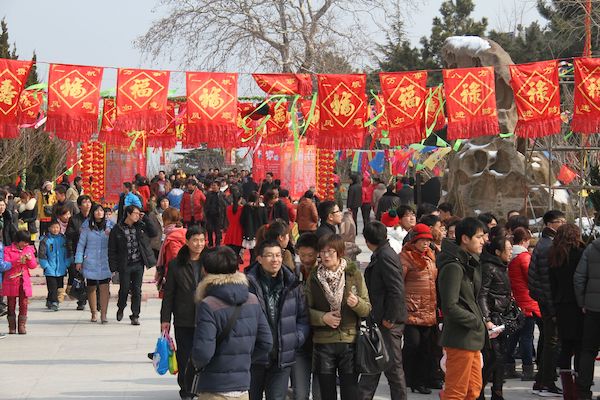
8. Do New Year’s Greetings
Greeting in the New Year is one of the traditional customs, a way for people to say goodbye to the old and welcome the new and express their good wishes to each other. On the second and third days of the Lunar New Year, Chinese people start to visit their relatives and friends, pay their respects to each other, say congratulations and blessings, and say things like “Happy New Year”, “Congratulations” and “Happy New Year”.
The meaning of New Year’s greetings is to visit friends and relatives and to express their feelings for each other and their wishes for the new year.
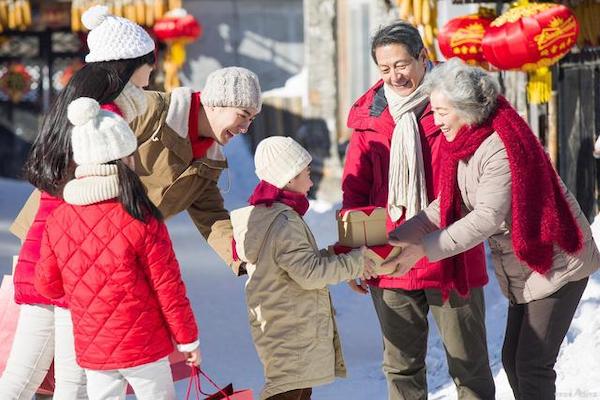
What is the Unique Food during the Chinese Spring Festival?
During the Chinese spring festival, people eat different kinds of food as food can be a key section of Chinese traditions. Usually, there are great differences between the north and south in eating. Below are common kinds of food in Chinese New Year.
1. Dumplings
On the New Year’s Eve dinner table for Chinese people in the north, dumplings are a great feast food.
Dumplings, also known as “jiao-er” and “jiaozi” in Chinese, mean the alternation of the old and the new. The dumplings are eaten on New Year’s Eve, which means “to turn over the new year”.
In addition, dumplings share the same shape with Yuan Bao, so eating dumplings on New Year’s Eve is to “attract wealth and treasure”.
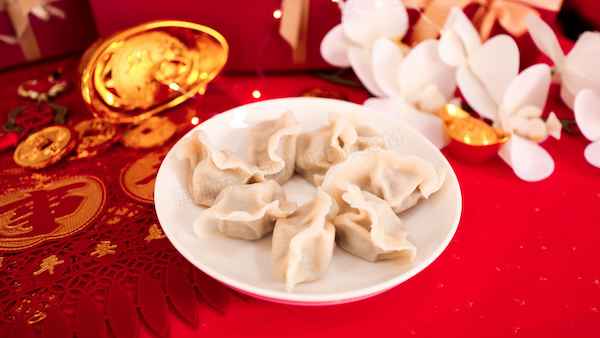
2. Rice Cake
It is a custom in many places to eat rice cakes during Chinese New Year, such as red/white rice cakes in Fujian, water-ground rice cakes in Ningbo, cinnamon sugar rice cakes in Suzhou, rice cakes with hundred fruits in Beijing and sticky cakes in the north.
In China, people deem the custom to eat rice cake a behavior to secure a better new year.
3. Fish
The most important thing on the Chinese New Year table is fish, because fish is the same as “Yu”, which stands for “surplus” and means “surplus for every year”. The fish should be the last dish of the New Year’s Eve dinner and should not be eaten up, as this symbolizes the “surplus” of the year.
4. Soup dumplings
In the south of China, it is customary to eat dumplings during the Chinese New Year. The word “round” in dumplings means “reunion” and “success”, symbolizing family harmony and a sweet life.
5. Noodles
In some areas of Fujian province, it is customary to eat noodles during the New Year. The noodles are known for their symbolic meaning of longevity, so eating noodles on New Year’s Day also means “longevity” of the beloved.
6. Preserved Meat
In the old days, preserved meat was a particularly popular flavor in autumn and winter. After the 8th day of the Lunar New Year, basically every household starts making preserved sausages, preserved meat, preserved fish, and many other dishes.
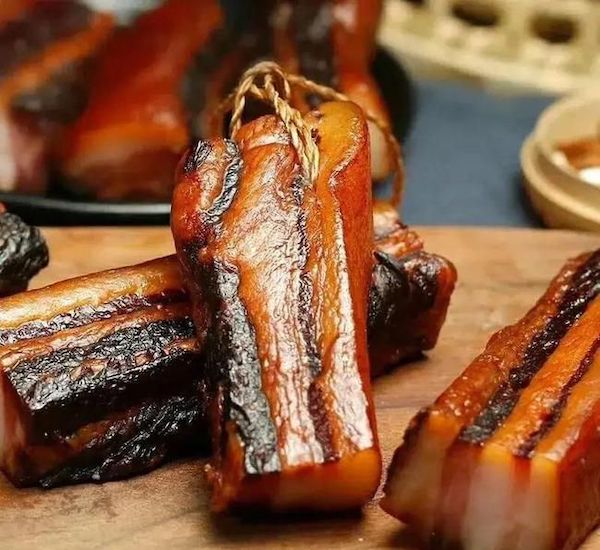
Chinese New Year in Foreign Countries
As Chinese New Year finds its way in many foreign countries, different nations celebrate it with different traditions.
Asian Nations
(1) North and South Korea
The New Year in North and South Korea is much the same as what it is in China.
The difference is that the New Year’s Eve meal is called “Gogok-rice”, a mixture of cloud beans, soybeans, pinto beans, black beans and rice, which is steamed together. They also eat rice cake soup, which is made by cutting rice cakes into round slices, adding some meat and boiling the soup with water.
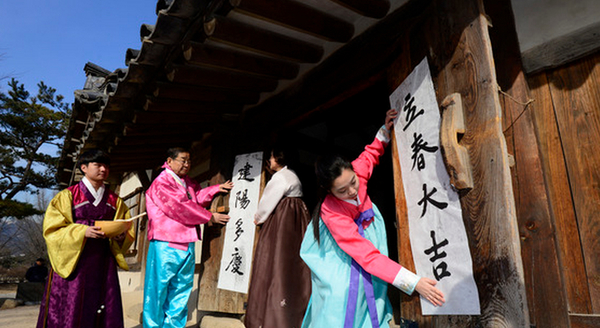
(2) Vietnam
The New Year customs in Vietnam are most similar to what they are in China, mainly including ancestors worshipping the gods, putting up spring scrolls, giving red envelopes, New Year’s Eve dinner, setting off firecrackers and visiting relatives.
The only difference may be that Vietnamese people wrap rice dumplings, while Chinese people like to steam buns and dumplings and holding temple fairs.
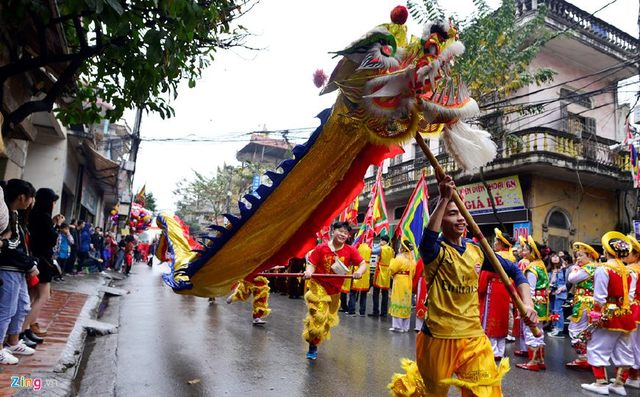
(3) Singapore and Malaysia
Both Singapore and Malaysia are also home to a large number of ethnic Chinese, so the New Year customs in these two countries are basically the same as what they are in China, but there are some slight differences.
One is the “double oranges”, where Singaporeans give two oranges in their pockets to friends and relatives as a token of “good fortune”, and the host family usually returns the gift with two oranges.
North America
In the melting pot of cultures in the United States, as the number of Chinese expatriates and ethnic Chinese increases and China’s position in the international community improves, more and more Americans are becoming interested in the traditional Chinese culture, especially the Chinese New Year.
In recent years, every Lunar New Year, from the President to local officials in areas with a large Chinese population, have used various occasions to wish the Chinese people a happy New Year and pay tribute to those who have made important contributions to American society.
To celebrate the Chinese New Year, Americans love to watch parades and fireworks.
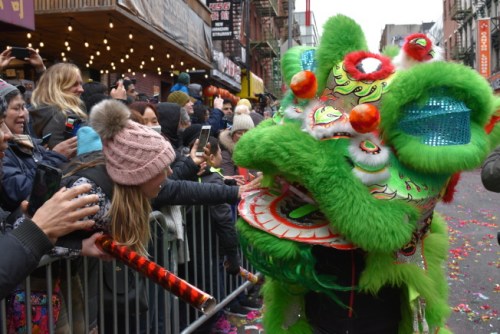
Europe
The first time I felt the Chinese New Year atmosphere in Europe came from the shopping experience at the Vienna Outlet, when a red sculpture of the Chinese character for Spring greeted me upon arrival, creating a strong visual impact.
Other countries like Italy, Spain and Hungary, where there is a dense Chinese population, also have a variety of celebrations, such as eating dumplings.
What are the Common Blessings/Greetings for the Chinese New Year/Spring Festival?
In China and beyond, there are some common greetings for people to deliver good wishes to others in the Chinese spring festival. If you want to greet others as Chinese during the Lunar New Year, you can refer to the list below:
- Happy New Year!
- Happy Chinese New Year!
- Happiness and prosperity!
- Happy year of the Rabbit (animal year)!
- Peace and safety!
- Peace and happiness!
- Happiness for the whole family!
- Good luck and life according to your wishes!
- Good luck again and again!
- Wealth’s sources broadly entering in!
- May your work go smoothly!
- Success in your career!
FAQ About Chinese New Year
Is Chinese New Year always February 12?
The Chinese New Year is the lunar new year, so it is not always February 12, as it was in 2022. According to the rules of the Chinese lunar new year, the Chinese New Year falls between January 21 and February 20.
How long is Chinese New Year?
The Chinese New Year lasts for 15 days from the New moon on the first day of the first lunar month and ends on the Full moon 15 days later.
Chinese New Year VS Chinese Spring Festival
The Chinese New Year is popularly known as the Spring Festival in China. As the Chinese New Year starts from the Beginning of Spring to mark the end of winter and the beginning of spring, so it is often called Chinese Spring Festival.
What Does Chinese Lunar New Year Mean?
The Lunar New Year in China means a celebration of the arrival of spring and the beginning of a new year on the lunisolar calendar.
How Many Days off for Chinese New Year?
Chinese people usually have 7 days off, and some of them even have 15 days off.
